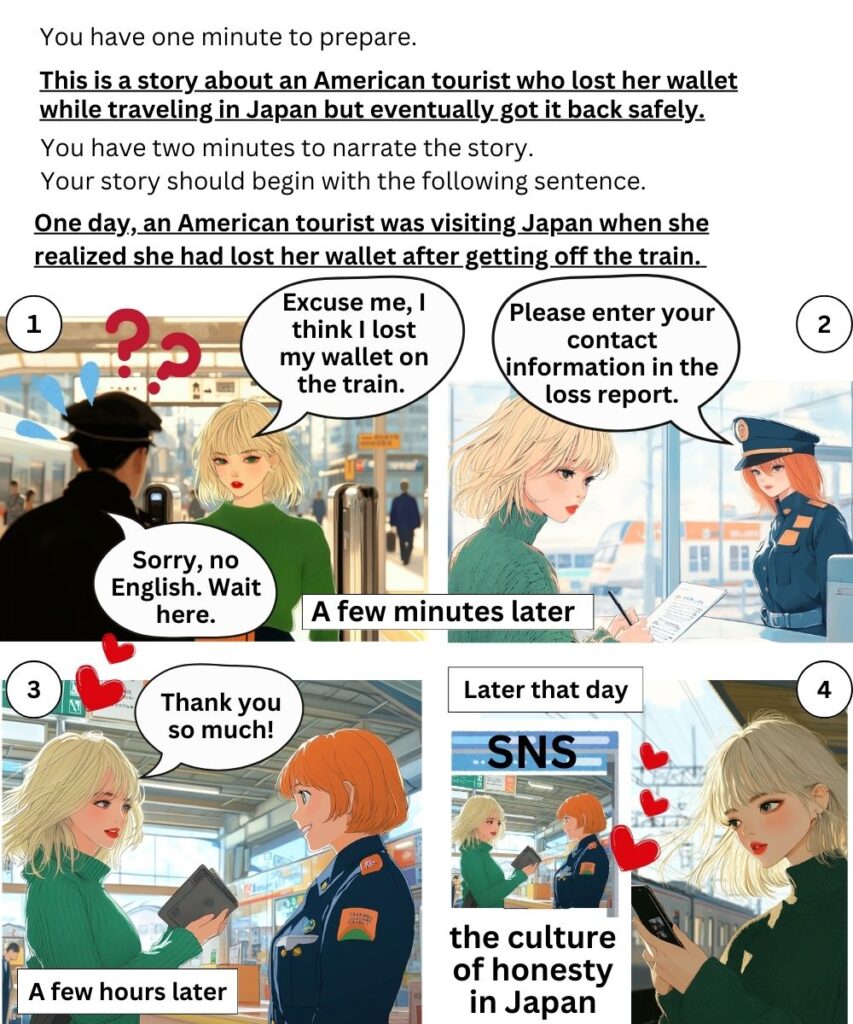メタディスクリプション:
実際の出題形式(問題カード)で英検準1級の面接練習を独学できるページです。
2024年度リニューアル対応!
所要時間:概ね8分
質問概要
ナレーション内容を考える(1分間)
イラストの内容を説明するナレーションを考える
ナレーション(2分間):ナレーションを始める
※2分以上続く場合は、途中でも中止させられるので注意
Q&A(No. 1):イラスト関連の質問
イラストに関連した質問。「問題カード」を見ながら解答できます。
※登場人物が考えている事などを聞かれます。
Q&A(No.2, No. 3)
問題カードに関連した、受験者の意見を問う質問
Q&A(No. 4)
問題カードのトピックに少し関係のある質問。受験者の意見を問う質問
※この<No. 4>質問文に「導入文」が追加されました。
問題カード

ナレーションと質問
ナレーション指示
<指示>Look at the pictures carefully and read the directions silently for one minute.(1分間)
<指示>Now, please begin your narration.(2分間)
Question No.1
Please look at the third picture. If you were the tourist, what would you be thinking?
Question No.2
Do you believe Japan’s culture of honesty makes it a safer place for tourists?
Question No.3
Do you think the tourist’s positive experience will encourage others to visit Japan?
Question No.4
As Japan continues to welcome more international tourists, do you think Japan should shift towards creating rules and systems that align with global standards?
質問音源チャレンジ
本番のように、英語の質問を聞いて答える練習をしてみましょう。
ナレーション準備
ナレーション開始
Question 1 mp3
Question 2 mp3
Question 3 mp3
Question 4 mp3
解答例
ナレーション例
全文音源:
<1> One day, an American tourist was visiting Japan when she realized she had lost her wallet after getting off the train. Confused and worried, she approached a station employee and explained that she thought she had lost her wallet on the train. The employee, although not fluent in English, understood her situation and told her to wait.
ある日、アメリカ人観光客が日本を訪れていたとき、電車を降りた後に財布をなくしたことに気づいた。彼女は混乱し心配しながら駅員に近づき、電車の中で財布をなくしたと思うと伝えた。駅員は英語があまり得意ではなかったが、彼女の状況を理解し、待つように言った。
気持ちが乱れたり、心配したり、パニックになったりする表現を押さえておこう!
1. She felt anxious about missing her appointment.
– 彼女は予定に遅れることを心配して不安を感じた。
2. Frightened, she realized she was lost in the unfamiliar city.
– 怯えて、彼女は見知らぬ街で迷子になったことに気づいた。
3. Panicked, he searched frantically for his keys.
– パニックになって、彼は必死に鍵を探した。
5. Overwhelmed by the situation, she didn’t know what to do.
– 状況に圧倒されて、彼女は何をすべきか分からなかった。
6. He was agitated and unable to focus on the task at hand.
– 彼は動揺して、その場の仕事に集中できなかった。
7. Flustered by the sudden change of plans, she tried to stay calm.
– 突然の計画変更に混乱し、彼女は落ち着こうとした。
8. Distressed by the news, she couldn’t concentrate on her work.
– その知らせに心を痛め、彼女は仕事に集中できなかった。
<2> A few minutes later, the tourist was guided to another employee who asked her to fill out a report with her contact information. She did so, still anxious about her missing wallet.
数分後、観光客は別の従業員に案内され、連絡先情報を報告書に記入するよう求められた。彼女は財布がなくなったことをまだ心配しながらもそうした。
書類やフォームに関する表現をまとめておこう。
1. fill out – (書類やフォームに)記入する
2. fill in – (特定の欄に)書き込む、記入する
3. complete – (書類やフォームを)完成させる、記入し終える
4. sign – 署名する、サインする
5. submit – 提出する
6. mark – (チェックボックスなどに)印をつける
7. check – チェックを入れる、確認する
8. write down – 書き留める、記入する
9. enter – (情報を)入力する、記入する
<3> A few hours later, to her relief, the tourist was informed that her wallet had been found. She gratefully thanked the employee as she received it back. The experience made her realize how safe and well-organized Japan was, which gave her peace of mind for the rest of her trip.
数時間後、観光客は財布が見つかったと知らされて安心した。彼女はそれを受け取りながら従業員に感謝の気持ちを表しました。この経験により、彼女は日本がいかに安全でよく整備されているかを実感し、残りの旅行に向けて安心感を得ることができました。
「was informed = 知らされた」のバリエーションを押さえておこう
1. She was notified that her package had arrived. 彼女は荷物が届いたことを通知された。
2. He was told about the meeting time. 彼は会議の時間を知らされた。
3. They were advised to evacuate due to the storm. 彼らは嵐のため避難するよう助言された。
4. She was updated on the progress of the project. 彼女はプロジェクトの進捗状況を知らされた。
5. He was made aware of the changes to the policy. 彼は方針の変更を知らされた。
6. They received word that the event was canceled. 彼らはイベントが中止になったことを知らされた。
7. The team was briefed on the upcoming tasks. チームは今後のタスクについて概要を知らされた。
<4> Later that day, the tourist shared her experience on social media, praising the honesty and helpfulness of the Japanese people. She was deeply impressed by the culture of honesty in Japan, feeling fortunate to have encountered such kindness during her trip. (180 words)
その日の後半、観光客はこの体験をSNSで共有し、日本人の誠実さと親切さを称賛した。彼女は日本の誠実な文化に深く感動し、旅行中にそのような親切に出会えたことを幸運に感じた。
Question 1 解答例
質問:33枚目の写真を見てください。あなたが観光客だったら、何を考えていますか?
If I were the tourist, I would be feeling anxious and worried about the possibility of not getting my wallet back, but also grateful that the station employees were helping me. I might also be thinking about how important it is to stay calm in such situations.
もし私が観光客だったら、財布が戻ってこないかもしれないという不安と心配を感じながらも、駅員が助けてくれることに感謝しているでしょう。また、このような状況では冷静さを保つことが重要だと考えるかもしれません。
Question 2 解答例
日本の誠実な文化は、観光客にとってより安全な場所だと思いますか?
Yes, I believe that Japan’s culture of honesty contributes significantly to making it a safer place for tourists. When people are honest, it reduces the chances of theft and other crimes, allowing tourists to feel more secure during their travels.
はい、日本の正直さの文化は、観光客にとってより安全な場所にするのに大きく貢献していると私は信じています。人々が正直であれば、盗難やその他の犯罪の可能性が減り、旅行者は旅行中により安心できるようになります。
Question 3 解答例
観光客のポジティブな体験が、他の人々が日本を訪れるきっかけになると思いますか?
Yes, I think the tourist’s positive experience will likely encourage others to visit Japan. When people share their positive experiences, especially on social media, it can influence others’ travel decisions and create a positive image of the country.
はい、その観光客の良い経験が、他の人々が日本を訪れることを促す可能性が高いと思います。特にソーシャルメディアでポジティブな経験が共有されると、他の人々の旅行の決断に影響を与え、その国のイメージを良くすることができます。
Question 4 解答例
日本が海外からの観光客を受け入れ続ける中で、日本はグローバルスタンダードに沿ったルールや制度を作る方向にシフトすべきだと思いますか?
Yes, I think Japan should consider adopting more global standards, especially in areas where cultural differences might create misunderstandings. For example, international tourists may not be familiar with Japan’s culture of trust, so introducing systems like upfront payment requirements or stricter reservation policies could help prevent issues.
はい、日本は、特に文化の違いが誤解を生む可能性のある分野で、よりグローバルな基準を採用することを検討すべきだと思います。たとえば、日本の信頼文化に馴染みのない国際的な観光客のために、前払い制やより厳格な予約ポリシーを導入することで、トラブルを防ぐことができるでしょう。
No, I believe Japan should maintain its unique systems and cultural practices. While global standards can be beneficial, Japan’s distinct approach to hospitality and organization is part of what makes it special. Adopting global standards might dilute the unique experiences that attract tourists to Japan in the first place.
いいえ、日本は独自のシステムや文化的な慣習を維持すべきだと思います。グローバルな基準は有益なこともありますが、日本の独特なホスピタリティや組織運営の方法こそが、日本を特別な存在にしています。グローバル基準を採用することで、そもそも観光客が日本に魅了される独自の体験が薄れてしまうかもしれません。
面接練習はask本校にお尋ねください:無料体験レッスン予約
こちらの投稿もおススメです:英検準1級面接問題カード|在宅勤務トピック質問と回答例
日本文化ジョーク
1. お辞儀の文化
- English: Why did the Japanese businessman take a bow at his desk?
Because he wanted to give his work the utmost respect! - Japanese: なぜ日本のビジネスマンはデスクでお辞儀をしたの?
仕事に最大限の敬意を表したかったからだよ! - 解説: 日本では、お辞儀は尊敬の意を示す一般的な方法です。このジョークは、仕事そのものにもお辞儀をするほどの敬意を払うというアイデアを面白おかしく表現しています。
2. お弁当の愛
- English: Why don’t Japanese lunch boxes ever get angry?
Because they always have everything neatly boxed up! - Japanese: なぜ日本のお弁当は怒らないの?
いつもきちんと箱に収まっているからさ! - 解説: 日本のお弁当は、整理整頓され、美しく盛り付けられることで有名です。このジョークは、お弁当があまりに整然としているため、怒る理由がないという点をユーモラスに描いています。
3. ふとん
- English: What did the futon say to the blanket?
“You’re too clingy, let’s keep things laid back.” - Japanese: ふとんは毛布に何と言った?
「君はしがみつきすぎだよ、もっとリラックスしよう。」 - 解説: 日本では、ふとんは床に敷いて使う寝具です。このジョークは、「laid」という言葉が「敷く」という意味と「リラックスする」という意味の二重の意味を持つ点を利用しています。
4. 謙虚な「すみません」
- English: Why did the Japanese person apologize to the ATM?
Because they thought they were withdrawing too much respect! - Japanese: なぜ日本人はATMに謝ったの?
あまりに多くの敬意を引き出していると思ったからだよ! - 解説: 日本では、必要以上に謝ることがよくあります。このジョークは、人が無機質なものにまで謝るという過剰な礼儀を面白おかしく表現しています。
5. 自動販売機
- English: Why don’t Japanese vending machines get lonely?
Because they always have plenty of change! - Japanese: なぜ日本の自動販売機は寂しくないの?
いつもたくさんのおつりがあるからさ! - 解説: 日本は自動販売機が非常に多く、どこにでもあります。このジョークは、「change」という言葉が「おつり」と「変化」の二重の意味を持つ点を利用しています。
6. コンビニ
- English: What do you call a super convenient convenience store?
A konbini that also does your taxes! - Japanese: 超便利なコンビニって何?
税金もやってくれるコンビニさ! - 解説: 日本のコンビニは非常に多くのサービスを提供していることで知られています。このジョークは、コンビニが税金の手続きまでしてくれるほど便利だという点をユーモラスに誇張しています。
7. 静かな電車
- English: Why did the Japanese train go to therapy?
Because it couldn’t stop bottling up its feelings! - Japanese: なぜ日本の電車はセラピーに行ったの?
感情を抑え込むのをやめられなかったからだよ! - 解説: 日本の電車はとても静かで、乗客は会話を控えることが一般的です。このジョークは、電車が感情を抑え込んでいるかのように擬人化し、その結果セラピーが必要だとするユーモラスな表現です。
これらのジョークは、日本の文化的な特徴を捉え、それをユーモアを交えて紹介しています。




